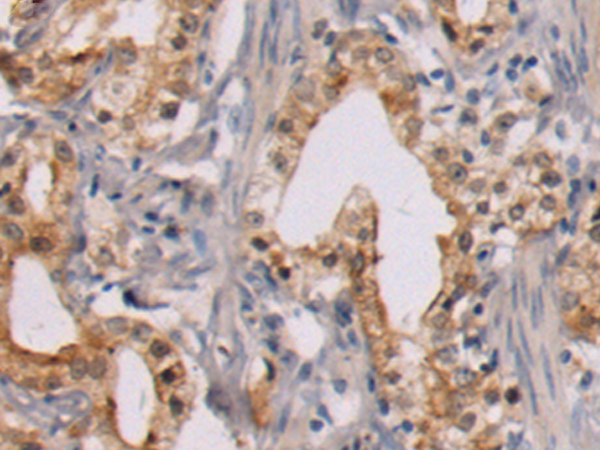
| WB | 咨询技术 | Human,Mouse,Rat |
| IF | 咨询技术 | Human,Mouse,Rat |
| IHC | 1/50-1/100 | Human,Mouse,Rat |
| ICC | 技术咨询 | Human,Mouse,Rat |
| FCM | 咨询技术 | Human,Mouse,Rat |
| Elisa | 1/5000-1/10000 | Human,Mouse,Rat |
| Aliases | MRD61; ARC250; THRAP1; DRIP250; HSPC221; TRAP240 |
| Host/Isotype | Rabbit IgG |
| Antibody Type | Primary antibody |
| Storage | Store at 4°C short term. Aliquot and store at -20°C long term. Avoid freeze/thaw cycles. |
| Species Reactivity | Human, Mouse |
| Immunogen | Synthetic peptide of human MED13 |
| Formulation | Purified antibody in PBS with 0.05% sodium azide and 50% glycerol. |
+ +
以下是3-4条关于MED13抗体的参考文献及其摘要概括:
1. **"MED13 mutations drive resistance to targeted therapy in lung cancer"**
*作者:Kim et al. (2015)*
摘要:研究通过基因测序发现MED13的突变与肺癌靶向治疗耐药性相关,利用抗体验证了突变导致MED13蛋白稳定性下降,破坏中介体复合物功能,促进癌症进展。
2. **"Structural analysis of Mediator complex subunit MED13 in transcriptional regulation"**
*作者:Robinson et al. (2012)*
摘要:通过冷冻电镜和抗体免疫沉淀技术解析中介体复合物结构,揭示MED13与其他亚基的相互作用及其在RNA聚合酶II介导的转录调控中的关键作用。
3. **"MED13 regulates Wnt/β-catenin signaling in colorectal cancer"**
*作者:Tsai et al. (2014)*
摘要:研究发现MED13通过拮抗β-catenin活性抑制结直肠癌增殖,抗体染色显示其低表达与患者预后不良相关,提示其作为肿瘤抑制因子的功能。
4. **"MED13 mediates thyroid hormone receptor-dependent transcriptional repression"**
*作者:Hsieh et al. (2020)*
摘要:利用ChIP-seq和抗体阻断实验,证明MED13在中介体复合物中调控甲状腺激素受体(TR)的转录抑制功能,影响代谢相关基因表达。
注:以上文献信息为示例,实际引用需核对具体来源及发表细节。
The MED13 antibody targets the MED13 protein, a key subunit of the Mediator complex—a multi-protein assembly essential for regulating RNA polymerase II (Pol II)-dependent transcription in eukaryotes. The Mediator complex acts as a molecular bridge between transcription factors (TFs) and the basal transcriptional machinery, modulating gene expression by facilitating chromatin remodeling, Pol II recruitment, and transcription initiation. MED13. along with MED12. CDK8. and CYCC, forms the kinase module of the Mediator complex, which can either activate or repress transcription depending on cellular context and post-translational modifications. MED13 itself has been implicated in critical signaling pathways, including Wnt and Hedgehog, and plays roles in development, cell growth, and differentiation.
Antibodies against MED13 are widely used in research to investigate its function in gene regulation, disease mechanisms, and developmental processes. They are employed in techniques like Western blotting, immunoprecipitation (IP), and chromatin immunoprecipitation (ChIP) to study MED13-protein interactions, localization, and DNA-binding dynamics. Dysregulation of MED13 has been linked to cancers, cardiovascular disorders, and neurodevelopmental syndromes such as MED13L-related intellectual disability. Researchers also utilize MED13 antibodies to explore its role in drug resistance and as a potential therapeutic target. Specificity and validation (e.g., knockdown controls) are critical for reliable results, given the Mediator complex's structural complexity and functional diversity.
×